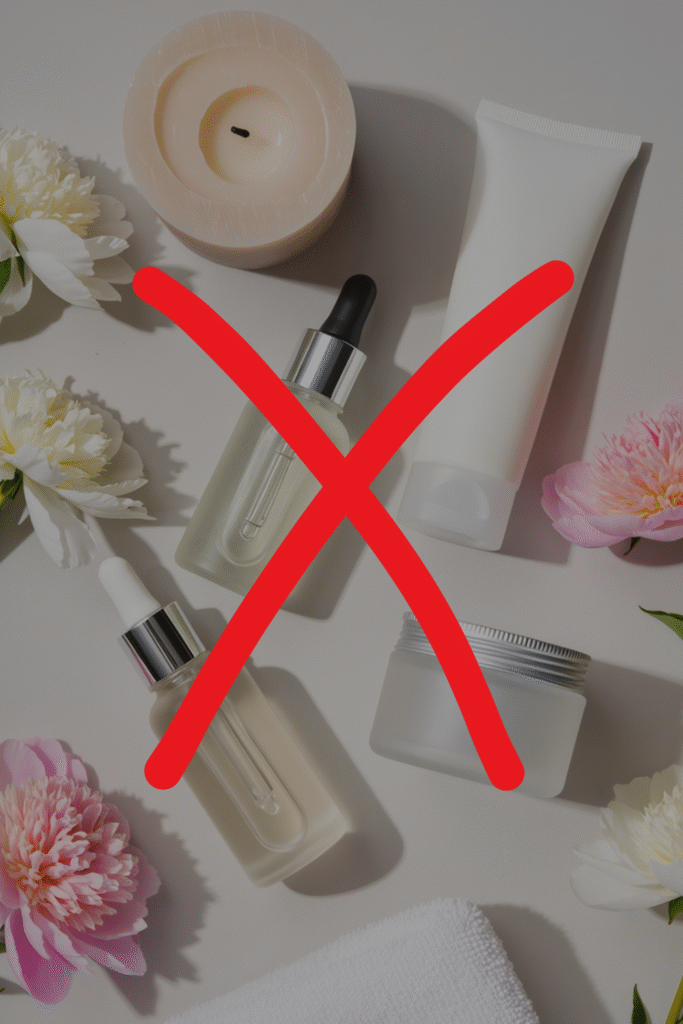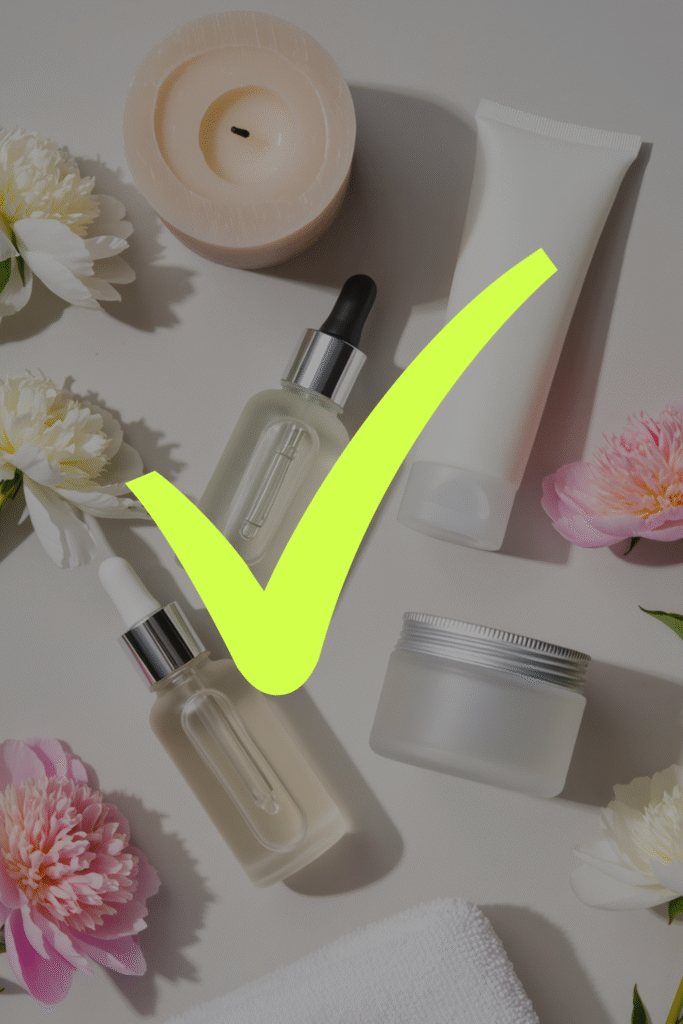Pregnancy is such an exciting time—but it can also leave you questioning everything in your bathroom cabinet. Suddenly, ingredients you’ve used for years are off-limits, and it can feel overwhelming to figure out what’s safe for you and your baby.
If you’ve been through hell just to get pregnant (like me), even more so. I was literally paranoid at the beginning and I hope this guide makes it a bit easier for some of you reading this post.
The good news? You don’t need to sacrifice glowing, healthy skin while pregnant. With a few simple swaps, you can create a routine that’s both effective and safe.
*The last part of this blog post includes affiliate links to products I genuinely love and used during my own pregnancy. With that I can earn a small commission with no extra cost to you. This blog post is in no way sponsored.
🌸 Ingredients to Avoid During Pregnancy (evidence-based)

I want to get to the scary bit first – what not to use. Of course pregnant women will never be a part of a safety study for drugs and medicine so all of this evidence is retrospective, but please avoid everything on this list; you can never be too careful when it comes to the health of your baby.
1. Retinoids (retinol, retinal, tretinoin/Retin-A, adapalene, tazarotene; oral isotretinoin, acitretin, alitretinoin)
- Why avoid: Oral retinoids are proven teratogens. This means they cause birth defects, still births or miscarriages. Topical retinoids have low systemic absorption and meta-analyses haven’t shown a major increase in birth defects, but data are limited—so dermatology and teratology groups advise avoiding them during pregnancy.
2. High-strength salicylic acid (BHA) & oral salicylates
- Why avoid (in high doses): Systemic salicylates at high doses can pose risks such as miscarriages or low amniotic fluid (oligohydramnios); strong peels or covering large body areas increase absorption.
- What’s generally okay: Low-dose, topical salicylic acid (≤2%) used on small areas is considered acceptable by OB/GYN and teratology resources; avoid peels and large-area leave-ons.
3. Hydroquinone (skin-lightening)
- Why avoid: It has high percutaneous absorption (~35–45%). Human data haven’t shown a clear increase in malformations, but because absorption is relatively high and data are limited, experts recommend minimizing or avoiding during pregnancy.
4. Certain essential oils (especially uterotonic oils like clary sage; also use caution with concentrated/undiluted oils)
- Why avoid/caution: Evidence in pregnancy is limited and quality varies; some oils may stimulate the uterus or irritate skin. UK maternity guidelines advise avoiding direct essential-oil contact in the first trimester and avoiding clary sage because of uterine-stimulation concerns. Never ingest; if used later in pregnancy, keep well-diluted and discuss with your clinician.
🌸 Pregnancy-Safe Skincare Heroes

Pregnancy can make your skin act in all sorts of unexpected ways – breakouts, dryness, hyperpigmentation – while also putting many favourite ingredients (like retinoids) off-limits. I was pregnant with a baby girl and my skin went from bad to worse – as they say – the girl takes all you beauty. And oh she did. But the good news? There are plenty of safe, effective, and dermatologist-approved options to keep your skin glowing while protecting both you and your little one.
1. Gentle Cleansers 🧼
Your skin may become more sensitive during pregnancy, so a mild, hydrating cleanser is key. Look for sulfate-free formulas that clean without stripping natural oils.
- Why it’s safe: Gentle cleansers don’t contain harsh actives, making them ideal for daily use morning and night.
- Great picks: CeraVe Hydrating Cleanser, La Roche-Posay Toleriane Hydrating Cleanser.
2. Hydrating Toners & Mists 💧
Skip harsh exfoliating toners and reach for hydrating, soothing formulas instead. Ingredients like aloe vera, glycerin, and hyaluronic acid provide lightweight hydration.
- Why it’s safe: These ingredients mimic what your skin naturally needs to stay plump and comfortable.
- Try: Hada Labo Gokujyun Lotion (cult-favorite Japanese), Anua Heartleaf 77% Soothing toner (Korean), Avène Thermal Spring Water Spray for a calming mist throughout the day.
3. Vitamin C Serums 🍊
If you’re missing your retinol glow, Vitamin C is your best friend (thankfully so!!). It’s a powerful antioxidant that helps brighten skin, fight free radicals, and support collagen production.
- Why it’s safe: Vitamin C is non-teratogenic and considered safe in topical skincare during pregnancy.
- Try: Mad Hippie Vitamin C Serum (gentle and affordable) or Rohto Mentholatum Vitamin C (my go to!)
4. Moisturizers 🧴
Hormonal changes can make skin drier than usual. Choose moisturizers rich in ceramides, shea butter, and squalane to support the skin barrier and lock in hydration.
- Why it’s safe: These ingredients mimic natural skin lipids and provide deep hydration without harmful effects.
- Try: CeraVe Moisturizing Cream (dermatologist classic), The Ordinary Natural Moisturizing Factors + HA or Korean Illiyoon Ceramide Ato Concentrate Cream
5. Sunscreen (the #1 essential!) ☀️
Daily SPF is the most important pregnancy skincare step — not just for skin health, but also to prevent melasma (“the mask of pregnancy”), which can worsen with sun exposure.
- Best choice: Mineral sunscreens with zinc oxide or titanium dioxide. They sit on the skin’s surface and are considered the safest option during pregnancy.
- Try: EltaMD UV Clear Broad-Spectrum SPF 46 or Japanese classic Beauty of Joseon Relief Sun Aqua-Fresh
6. Spot Treatments ✨
Breakouts are common during pregnancy thanks to hormonal changes, but many acne treatments are off-limits.
- Benzoyl Peroxide: Small amounts (≤5%) may be considered safe by some dermatologists, but always check with your doctor first.
- Sulfur-based treatments: A safer, effective option for calming active breakouts.
- Why it’s safe: Sulfur has been used for decades as a gentle acne treatment without systemic risks.
🌿 Final Note
Always remember: every pregnancy is different. While these products are generally considered safe, it’s best to double-check with your OB/GYN or dermatologist before introducing anything new. Skincare during pregnancy doesn’t have to be complicated — stick to gentle hydration, safe actives like Vitamin C, and consistent sunscreen.
🌸 Bonus: Body Care for Pregnancy
Pregnancy isn’t just about your face — your body deserves some extra love, too. As your belly grows and hormones shift, your skin may feel itchy, tight, or more sensitive than usual. The right body care can make a world of difference in keeping you comfortable and confident.
1. Stretch Mark Oils & Creams 🌿
While no product can guarantee you won’t get stretch marks (genetics plays a big role!), keeping your skin well-nourished and supple may help minimize their appearance. Look for rich emollients and natural oils that lock in hydration and improve skin elasticity.
- Safe picks: Cocoa butter, vitamin E, shea butter, almond oil, and plain jojoba oil.
- Pro tip: Massage your belly, hips, and thighs once or twice a day — not just for the skincare benefits, but also as a mindful ritual to connect with your growing baby.
2. Anti-Itch Lotions 🤲
Itchy skin is one of the most common pregnancy complaints, especially as your bump stretches. The safest way to soothe irritation is with colloidal oatmeal–based creams or fragrance-free moisturizers that calm and hydrate.
- Safe picks: Aveeno Skin Relief Moisturizing Lotion (oatmeal-based), CeraVe Itch Relief Cream (fragrance-free, dermatologist recommended).
- Pro tip: Keep your showers short and lukewarm — hot water can strip oils and make itching worse.
Other Helpful Add-Ons 🌸
- Cooling gels with aloe vera for hot summer days.
- Compression socks to ease swelling in legs and feet.
- Gentle body scrubs (sugar-based, not chemical exfoliants) once a week to keep skin soft.
✨ Final Thoughts
Pregnancy is all about nurturing your body, and skincare can absolutely be part of that ritual. By focusing on hydration, gentle protection, and safe actives, you can keep your skin glowing without worry.
And remember: when in doubt, always check with your dermatologist or OB-GYN before introducing a new product. Your peace of mind is just as important as your skincare routine.
